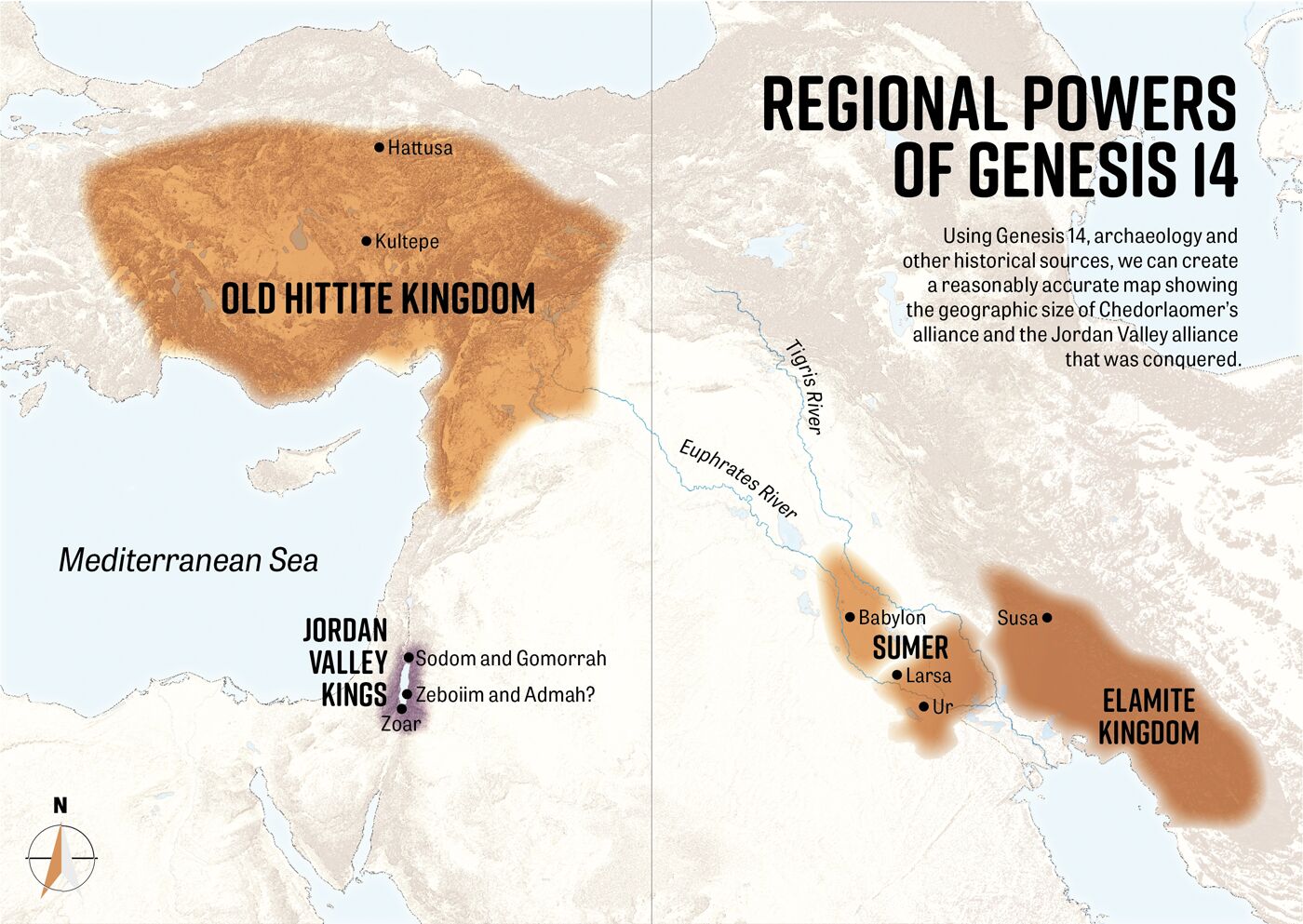Genesis 14-15; Job 3-4; Proverbs 1:8-19;
Commentary on Genesis 14:
- The kings of Sodom, Gomor’rah, Admah, Zebo’im, Be’la (or Zo’ar) used to serve (were vassals to) Chedorlao’mer, the king of E’lam (in Mesopotamia), for twelve years, but in the thirteenth year, they rebelled.
- Chedorlao’mer then builds an alliance with loyal kings from Shi’nar, Ella’sar, and Goi’im to fight the rebellion. On their way to fight the five rebel kings, they subdue and plunder the kingdoms and people in-between.
- The rebel five kings join forces to fight Chedorlao’mer’s forces in the Valley of Siddim. The rebels lose, and Chedorlao’mer plunders the cities, taking their resources, and capturing Lot, who was living IN Sodom (as opposed to near Sodom as before), and his goods.
- Abram comes to know about Lot’s captivity and assembles a group of 318 allied men to rescue him. Abram then pursues Chedorlao’mer’s forces, and using “guerrilla’ tactics, is able to rescue Lot and the spoils of people and property taken by the Mesopotamian armies.
- Melchiz’edek, king of Salem, priest, brings bread and wine and blesses Abram and blesses God for delivering the enemies into Abram’s hand.
- Abram pays tithe (a tenth of everything, “dízimo”) to Melchiz’edek.
- The king of Sodom offers all his properties to Abram, but he declines it, saying that he promised to God that he wouldn’t take anything that the king of Sodom has.


The first thing that pops into my mind is the Eucharistic reference in Melchizedek, a “priest of God Most High”, bringing bread and wine (Gen 14:18), and blessing Abram and God. In the New Testament, Christ is described as a priest according to the order of Melchizedek (Heb 7).
The tithe payed by Abram prefigures the Levitic law, where the other tribes have to pay a tenth of their earnings to the Levite tribe.
Again, we see how sin leads to brokenness and destruction. Lot, decided to go towards Sodom, and ends up living inside it, a city of wicked man and great sinners (Gen 13:13). His actions leads to his captivity, which brings Abram to enter the war to save him. By Divine Providence (Gen 14:20), Abram is able to conquer the Mesopotamian forces and rescue the captured people and properties.
Commentary on Genesis 15:
- God appears to Abram in a vision and promises him, currently in an old age and childless, that he’ll have many descendants, as many as stars in the sky. And Abram believes him.
- God asks Abram to bring some animals and he brings them and cut them in two.
- As the sun was going down, God says to Abram that his descendants will be slaves and oppressed in a land that it isn’t theirs for 400 years, but God will judge those nations and his descendants will have great possessions.
- After sunset, when it was dark, God, appearing as a fire pot and a flaming torch passes through the animals’ pieces, making a covenant with Abram, that he will give the land to his descendants.
The process of passing through a hallway of splitten animals was the sign of making a Covenant in the old times. It signified that if someone broke the agreement, they can be broken like the animals they’re passing through are. Interestingly, God is the one who passes through the covenant. Probably because He knew that Abram and his descendants would break the covenant many times.
Commentary on Job:
-
Job 3: Upon severe distress, death seems preferable to life, as Job curses the day of his birth, saying that it would have been better to have died at birth or by miscarriage than living like this. He questions why his mother’s knees and breasts “received” him. He sees death as a quiet place of rest where he’ll be relieved of his sufferings.
-
Job 4: Eliphaz, one of Job’s friends espouses the view that suffering is a result of sin.
-
He says that Job, despite having instructed people in the past, now, when he is the one suffering, he is being impatient.
-
Job’s fear of God should be his confidence, and his integrity, his hope.
-
No innocent person has ever perished, and those who sow trouble reap the same.
-
No one is perfectly righteous before God, not even His Angels.
Curse in the text comes from the Hebrew word “revile” or “treat as worthless”.
Eliphaz abides by the principle of retribution: where God will retribute people based on their behavior: if they sin, they suffer; if they are righteous, they reap good material rewards. Thus, according to Eliphaz, Job’s current suffering is the result of (unrepented) sin.
My guess is that Eliphaz will be proven wrong. Not all suffering is a result of sin. Suffering itself is a result of sin, and because we live in a broken and sinful world, we suffer. But not all individual suffering is the result of retribution of a committed sin.
Here some proposed questions from the Bible I’m reading:
Gen 3:1-10. In cursing the day of his birth—an event long past—what is Job really cursing? Assuming that a curse is a prayer that evil might befall someone or something, how likely is it that God would answer such a prayer?
Job is cursing his life. Or, at least his own current state of affairs. I do think God is not likely to anwer a prayer to take away the life of someone, specially if it’s their own life.
Gen 3:11-13. What is the attraction of death among those who entertain suicidal thoughts? How does Job’s vision of death compare with your own?
I’m a little bit dyslexic, so I initially that it was asking how Job’s suicidal thoughts compared to my own xD, and it hit right at home.
Having suffered from suicidal thoughts myself, Job conveys a similar feeling that I had: it’s more about the desire of ending the suffering. Job envisions death as a peaceful, quiet sleep, where he will finally be able to rest. Job has a similar “line of thinking” that many in depression/suicidal episodes hold: I’m currently in pain; If I cease to exist, there won’t be no pain; Thus, it is preferrable to cease to exist.
I do think, though, that Eliphaz has a point. Faith (fear of God, as he describes it, Gen 4:6) in the Lord should be the cornerstone of our lives. And only through the supernatural virtue of faith, we can develop the other theologal virtues of charity (love) and hope. And a glimmer of hope, sometimes, is all we need to see, to believe that there’s something better after this. And because I believe, I can pass through it.
Today I read about the life of Saint Emmanuel. He was a martyr of the fourth century. Because of his christianity, he refused to worship the Roman sun god, and the emperor ordered torture and death to him and his brothers.
Being the firstborn, Emmanuel was pierced with an iron nail in each shoulder, and another nail was driven through from ear to ear. Sharp splinters were also driven under the nails of his hands and feet. During the tortures, the brothers glorified God and prayed as if they did not feel pain. Finally, the Martyrs were beheaded, and Julian ordered that their bodies be burned
When I hear the martyrs’ stories, I think about my own failings as a christian. These people endured tremendous suffering for their faith. They could just deny Christ, and they wouldn’t go through all of this. But they didn’t. They didn’t betray Christ and His Church. Christianity is not a hippie religion, it is a deeply radical religion, and it shouldn’t be easy.
Lord, please give me a faith like Saint Emmanuel had. Saint Emmanuel, pray for me.
Gen 3:16. How do you respond when someone miscarries a pregnancy? How do you respond when someone chooses to abort a child? If there is a difference in your response, why?
Fortunately, I have had only few cases. The first was a coworker’s wife had a miscarriage, and he really wanted to be a father. He was extremely sad, crying, and it was visible the depths of despair of a father that had lost his child. I was sadden to know that that happened to him.
The second was more indirect. I met a girl while travelling that told the story of how her best friend had an abortion because she accidently got pregnant from her boyfriend. She still lived with their parents and didn’t told them.
I was sad to hear the story. Perplexed at the naturality of the girl telling the story (she was from Switzerland, the law is probably more flexible than in Brazil). An internal outrage to hear that the coward boyfriend incentivized this, because he “wasn’t ready to be a father”. Screaming internally to him: “Be a man and grow up! This is your responsability, and you should deal with this like a man!“.
I myself was a product of an “accident”, and I am extremely happy that my dad was not a coward, did not take the easy out, did not kill me, did not abandon me, and, on the contrary, raised me up as a single father. A real MAN. One of the characteristic I most value in a person, but especially in men, is the courage in trial times to raise up to their responsibility.
Gen 4:1—5:27. According to St. Ambrose, why is Job’s third “trial by words” not a trivial one?
The trial by words by St. Ambrose is that after losing all his belongings (including his family) and his own health, Job has to endure the harsh words of accusations of wrongdoing by his friends. And this is not easy, because harsh speech, especially when we’re already distressed, is psychologically hard and hurtful, and poses a significant burden on the listener.
Gen 4:12-21. What does Eliphaz claim to have received? Of what did it assure him? Why is man a lesser being than the angels here?
Eliphaz claims to have received revelation that not even angels are perfect as God is perfect. Man is a lesser being because we have physical bodies that are weak and makes our lives fragile.
Gen 4:3-5. Eliphaz accuses Job of failing to heed his own advice. Under what circumstances might you have been guilty of applying a double standard, one to others’ behavior and another to your own? Did your behavior change when you became aware of it?
In the sins and behaviors of the flesh, is extremely difficult to heed our own advices. I do find the “me” of the weekend having trouble following the advice and moral standards of the “me” of tuesday.
Gen 4:8. Eliphaz seems to quote a proverb, similar to “Sow the wind, reap the whirlwind” (Hos 8:7). In your experience, how true is this? What exceptions have you noticed?
It is true, but not necessarily in the retribution sense. It is clear that good and virtuous decisions help you in the future and sin and bad decisions lead to a path of brokeness. But there are always external factors we can’t control.
Commentary on Proverbs:
- Always listen to the teaching of your father and mother.
- Be careful hanging around people that do habitual wrongdoings.
- Be careful with temptations by peer pressure.
- Do not do violence, especially violence motivated by greed.
- Rewards acquired by evil means corrupt the life and soul of the evildoer.
- There is the way of wisdom and the way of foolishness.
Proverbs 1:8-19 is a warning against peer pressure and the dangers of violence, and especially violence motivated by greed. The cure for this is to walk in the way of wisdom, by listening to the teachings of your father and mother, and avoiding the company of those who do evil.